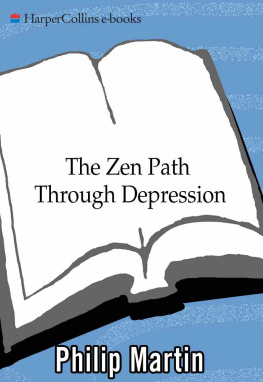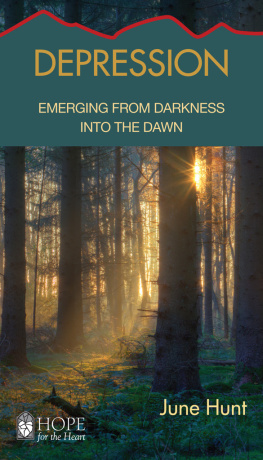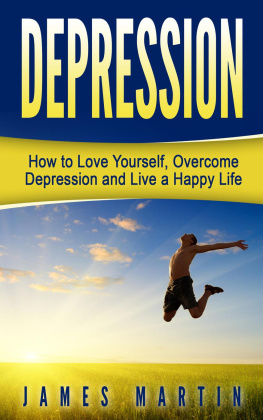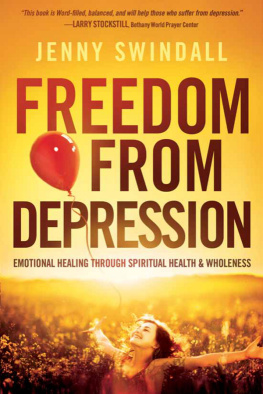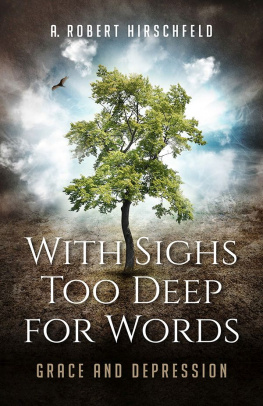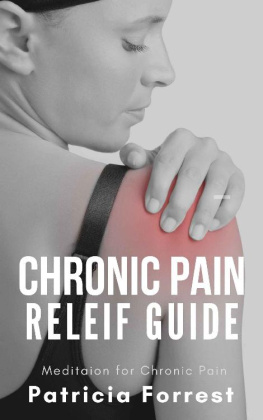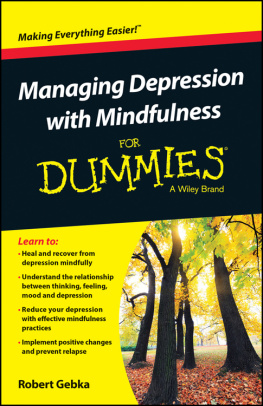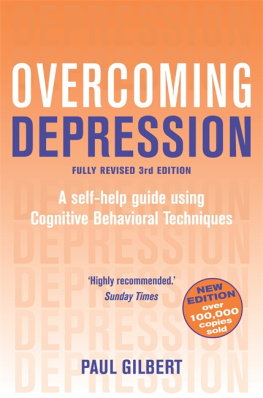I am indebted to Scott Edelstein, first editor, agent, and friend. Without his patient, generous assistance and encouragement, this book would never have come into being.
Sally Colemier, who shared in the early presentation of these ideas, taught me about honesty and fearlessness in saying what I had to say and kept me mindful of why I was writing.
Myron Malecha, John Robertson, David Pfeffer, and Marie Boehlke helped me on my own path through depression.
My Thursday friends Pat, Nelson, Dewey, Fred, and Kelly shared my excitement and kept me sane.
Ted Pirsig, so many Friday mornings ago, helped me to rediscover the joy of writing.
Those people and families I worked with through the years courageously showed me, day in and day out, how to live with dignity and hope.
My coworkers through the years taught me much about compassion and the passion to help others.
John Loudon, Karen Levine, and everyone else at Harper San Francisco were a pleasure to work with. They understood the work, as well as the neuroses, of a first-time author.
I am grateful to all those who shared their own struggles and healing.
Dainin Katagiri, Tomoe Katagiri, and everyone at the Minnesota Zen Meditation Center were invaluable teachers on the path. Charlie Greenman and George Zanmiller were there to help when I stumbled.
Thanks to my mother and father for their support and love.
Above all thanks to Therese and Joe, for your love and patience. Therese, you have taught me so much about faith and courage, as you have made your own journey.
In the middle of the path through life,
I suddenly found myself in a dark wood.
DANTE , DIVINE COMEDY
When I was seventeen, I went on a canoe trip with two friends in the wilderness of northern Ontario. We were on our own, with little more than our canoes and some dried rations. None of us were experienced travelers.
We thought we could do the trip without any help, relying on nothing more than our own resourcefulness and some good maps. But five days into the trip, we found ourselves utterly lost. We looked to our maps and we backtracked over our path, but still the landmarks we expected were nowhere to be found. A long rapids and waterfall were not where they were supposed to be, and there seemed to be a lake where one shouldnt have been. We were lost in unfamiliar territory, and our maps, and all the other resources we depended on within ourselves, were useless.
When at thirty-seven I found myself in a severe depression, the experience was much like being on that camping trip. I was again lost in unfamiliar territory, in a frightening yet beautiful place. All the landmarks were gone. Obstacles suddenly appeared where they shouldnt have been. The maps I had come to depend on showed nothing of the territory in which I found myself. Worst of all, I didnt even know myself that I was lost. And if I didnt know, how could anyone else know or offer help?
I had always depended on my practice of Buddhism to help me in difficult situations. But in this case it didnt seem enough, or relevant to what I was going through. Depression had stolen the life out of all I had found life-giving, and spiritual practice was no exception. Yet there seemed to be little that religious or spiritual teachings had to say about the experience of depression.
That isnt surprising, given the fact that so much of spirituality is based on the idea of transcendence and escape. And if there is one thing depression is not about, it is transcendence. It is instead an experience of being stuck in the mud, unable to rise up through the muck like the lotus flower so often used as a metaphor in spiritual teaching.
But I had always believed in a spiritual practice that was about settling deeply into life, going into the depths if necessary. So I persisted, trying to find a way to connect this practice to what was happening with me. Ultimately I discovered that in the downward movement of depression I could settle more fully into my life, and that in that settling there was great opportunity for learning, opening, and growing.
My practice and path are Zen Buddhism. I found I was finally able to bring my depression into the vastness of my practice, and I learned that others can, toowhatever their own spiritual leanings.
Depression is an illness not just of the body and mind, but also of the heart. Depression offers us an opportunity to deepen our spirit, our lives, and our hearts. There is much that we can learn about ourselves and our world through this journey. Through attentive, compassionate practice with the depression, it is possible to experience an even deeper healing, and grow in our spiritual lives.
This book is a guide to the wilderness that is depression, written by someone who knows the territory and has seen that a map alone is not enough. It is a guide to using our own inner resources, and to learning how to read and listen to the signs around us. It is ultimately a guide to growth, insight, and realization.
There is a story about Buddha in which one of his students asks him a highly speculative, theoretical question. Buddha responds with a story of a man who has been shot with a poisoned arrow. Buddha then asks, Would this man say, I will not allow this arrow to be removed until I know from what tribe the man who shot it came, or from what family he came, or what he did for a living, or what wood was used in the shaft? In the same way I have not answered those who want to know is the universe finite or infinite, is there a God or not, or other such questions. And what have I revealed? The cause of suffering and the path to its relief.
It is in this spirit that I make the offering of this book, in the hope of giving practical help to others in the pain of depression. May you use this book to guide you through that pain, and perhaps through the greater suffering of this life we all share.
A Note on the Explorations
The explorations you will find at the end of the chapters are opportunities for you to more deeply investigate the ideas in the chapter. They are not something to feel guilty about not doing, or failing to do right. Use them if they resonate with youif not, move on. They are invitations, not prescriptions.
Most of the meditations and visualizations are based on traditional Zen and Buddhist practices. You may find they work best for you if you do them in a quiet place, sitting straight-backed on a cushion or in a chair, but again, use them in a way that works best for you.
The verses are based on traditional practice poems called gathas . Rather than prayers or affirmations, they are used to bring us back to the present moment, and to help us remember how we want to live when faced with an obstacle or opportunity.
The other explorations are also for you to take or leave, as you see fit. Be gentle with yourself. Remember, this is your path to walk, and you are the one to decide which way to take.

